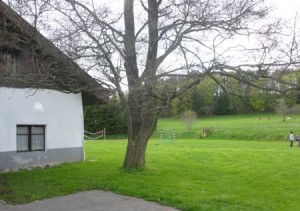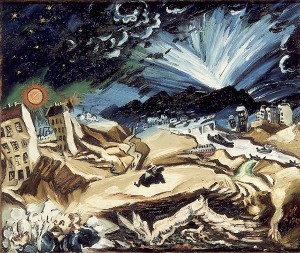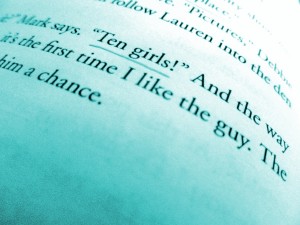
Youth hostel in alpine serenity
What’s the newest of the new in Jewish youth culture? To find out, I visited a machane, a Jewish summer camp, which congregated Europeans under the age of eighteen in a remote village in the Alps. Hoping to scout future Jewish ideas, themes, and memes, I had my eyes and ears open for interesting fashions, cool music, new media, games, slang, and food.
My quest was triggered by a slew of innovations brought about by the current generation. Deviators have exchanged their traditional tallitot (prayer shawls) for colorful ones with lilies and rainbows. Others have produced trip hop versions of Jewish songs, “Matzah raps,” and uploaded parodies of Biblical stories onto youtube. → continue reading
A cold wind blows tiles off of roofs and hats off of heads. The first pages of Robert Schindel’s new novel Der Kalte (The Cold One), read here by the author, are stormy. The Austrian novelist, poet and essayist born in 1944 already won over his readers with his persuasive images and poetic language in Gebürtig (Born-Where), published in 1992. Here too, the atmospheric beginning is reminiscent of the first line of the expressionist poem “Weltende” (End of the World): “From bourgeois’ pointed heads their bowlers flew, the whole atmosphere’s like full of cry” (Jakob van Hoddis).

Apocalyptic Landscape by Ludwig Meidner, 1913
© Ludwig Meidner-Archive, Jewish Museum Frankfurt-am-Main
Yet in the first scene of Schindel’s novel a world unfolds: Vienna of the Waldheim affair, from 1985 to 1989. During the 1986 Austrian election campaign, a debate ignited around the conservative candidate, Kurt Waldheim, who was indicted for war crimes. In his autobiography, he had concealed his time as a Wehrmacht-officer. Represented in the novel by the figure Johann Wais, he professes “that he had done nothing that one hundred thousand other Austrians had not done, too.” This is precisely why he functions “as an involuntary clarifying machine.” → continue reading
 In the past, a number of literary texts on Jewish topics contributed to Jewish culture in various ways. Some documented and revitalized oral history and folk tales in an attempt to save them from oblivion (e.g. Martin Buber’s Tale of the Hasidim); others made Jewish topics palatable to the majority society (e.g. Sidney Taylor’s All-of-a-Kind Family); and still others helped to build a Jewish community around shared experiences of ritual, emigration and persecution (e.g. Friedrich Torberg’s Tante Jolesch or The Decline of the West in Anecdotes).
In the past, a number of literary texts on Jewish topics contributed to Jewish culture in various ways. Some documented and revitalized oral history and folk tales in an attempt to save them from oblivion (e.g. Martin Buber’s Tale of the Hasidim); others made Jewish topics palatable to the majority society (e.g. Sidney Taylor’s All-of-a-Kind Family); and still others helped to build a Jewish community around shared experiences of ritual, emigration and persecution (e.g. Friedrich Torberg’s Tante Jolesch or The Decline of the West in Anecdotes).
Nathan Englander, one of the most sophisticated and provocative current writers, shares none of these intentions. His latest book, What We Talk About When We Talk About Anne Frank, is a collection of eight short stories loosely bound together under the title of (and a quote from) the first story, arising from a heated conversation about genocide; it refers to Anne Frank not as a historical figure, but as a metonym of victimhood. Accordingly, the stories reflect on the effect of Jewish themes, such as religion, the Holocaust and Israel, on modern Jewish identities. The author’s perspective is from within – he was born in 1970 to an Orthodox-Jewish family in New York – and critical. His gripping, intimate theatre-like episodes are fraught with tense dialog questioning the validity of Jewish cultural practice: → continue reading


